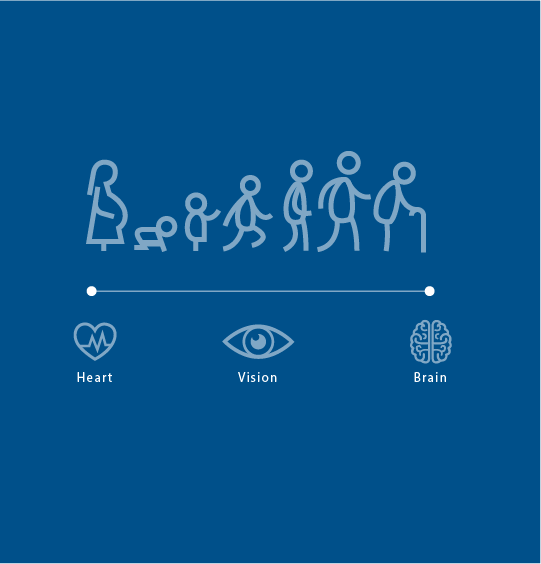DHA ORIGINS®, sustainably-produced omega-3 for natural health
Why do consumers prefer vegan omega-3?
Recognized, positive benefits for lifelong health
Omega-3 essential fatty acids are vital for the correct functioning of the human body. They cannot be made by our bodies and must therefore be sourced from the food we eat.
The omega-3s include the plant-derived alpha-linolenic acid (ALA), which can be obtained from a number of plant sources, including flaxseed oil, and the animal-derived eicosapentaenoic acid (EPA) and docosahexaenoic acid (DHA). Certain types of fish can be rich sources of EPA and DHA, but they are also present in other marine lifeforms. The conversion rate of ALA as a precursor into functionally-active EPA and DHA is low, and this is particularly true of DHA. DHA is therefore considered essential, whilst EPA is considered conditionally-essential.
It is well-recognised that EPA and DHA have important functions in cardiovascular, ocular and cognitive health throughout life, from the pre- and post-natal periods through to old age. These molecules are also involved in prevention of inflammatory, cardiovascular and neurodegenerative disease. In addition scientists are now researching their role in the immune system, and on their effect on the microbiome and neuropsychological balance, as well as in the prevention of Alzheimer’s and Parkinson’s disease.
The benefits of omega-3
The benefits of omega-3 are scientifically recognized and proven by over 4,000 studies. Docosahexaenoic acid (DHA) is the subject of European claims (EFSA : European Food Safety Agency) relating to cognitive, cardiovascular and vision health.1 and 2
GOED (the Global Organization for the EPA and DHA Industry) recommends daily consumption of 500 mg combined EPA and DHA . As such, omega-3s are part of an approach to preventive healthcare and optimization of our health capital, with a view to healthy development and healthy aging. They are therefore flagship ingredients in natural health products including nutraceuticals, dietary supplements and functional foods.


A response
to the expectations of demanding consumers
In Europe, a large number of consumers wish to take an active role in their own health, using gentle and natural products as a means of protecting and optimizing this valuable asset.
Consumers who want to live well and look after their health also take into consideration environmental protection issues.
The emergence of a new type of conscious consumer with high ethical standards dictates that businesses must be more transparent in their practices. These consumers are seeking natural active ingredients, traceability of the production chain, product source information, GMO-free ingredients, animal welfare guarantees, information on manufacturing processes and quality assurance. At the heart of their concerns are the clean label (nutritional labelling and quality), clean sourcing (origin and source) and clean process (production methods) of the food they consume.
Dietary supplements based on vegan omega-3 oils meet these expectations in full, and make an important contribution to consumer health and well-being.
Fermentalg aims to meet these high expectations from consumers, laboratories and dietary supplement manufacturers, in addition to nutritional requirements in the agri-food industry, by supplying natural microalgae health products such as vegan DHA, alternative plant-based proteins and natural food colorants. All of our ingredients are produced using methods that avoid harsh processes and preserve the native aspect and properties of the active ingredients.

The benefits of omega-3
- DHA contributes to the normal functioning of the brain. 1
- DHA helps maintainnormal vision. 1
- DHA helps maintain a normal level oftriglycerides in the blood. 1
- EPA and DHA help maintain normal blood pressure
- The consumption of DHA by the mother contributes to the normal development of the eyes of the fetus and the breast-fed child. 2
- The mother’s consumption of DHA contributes to the normal development of the brain of the fetus and the breastfed child. 2
- Consumption of DHA contributes to normal vision development in infants up to 12 months of age. 2
1: COMMISSION REGULATION (EU) No 432/2012 of 16 May 2012 establishing a list of authorized health claims made on foods, other than those referring to the reduction of the risk of disease and to the development and infant health
2: COMMISSION REGULATION (EU) No 440/2011 of 6 May 2011 on the authorization and refusal of authorization of certain health claims relating to food and relating to children’s development and health
